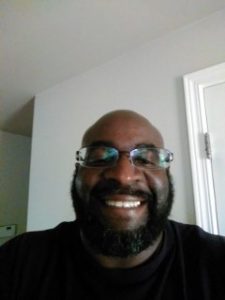That person needs us. That’s why we do it. February 28, 2017
Darryl Johnson, Auburn
For Darryl Johnson, caregiving came naturally, even when he was a child.
Johnson says people become caregivers because “it’s something that we have within ourselves. That person needs us. That’s why we do it. That’s who we are.” Darryl has been a caregiver most of his life and it all started when his grandpa came to live with his family as a kid. When his grandpa needed to go to the bathroom or wanted to go out for a walk he knew that he could always count on Darryl. For Darryl, being a caregiver is the best thing in the world. During this time Darryl built a foundation for understanding how to be a caregiver. He began figuring out the common sense of being a caregiver, “to do this you have to know what the person is going through and because everyone is different you can’t go by the book.”
Darryl has been a caregiver for his mother-in-law the past ten years. To care for his mother-in-law he wakes her in the morning and makes sure she has a chance to go to the bathroom and eat breakfast before he takes her to dialysis. While he waits with her he knows he is appreciated as she thanks him for taking the time to sit with her. As the caregiver for his mother-in-law he wears many hats. He is in charge of all the scheduling for her appointments and day, he ensures that all of her insurance is covered, and he physically assists her with day-to-day tasks. It is a special skill set and a lot to organize. Darryl calls himself just “a plain old American guy” who is “trying to take care of [his] family.”
Darryl was a janitor and had been recently promoted to a supervisor when his mother-in-law got sick. “It was hard–there was a sense of loss for my personal self,” he recalls, but by being a caregiver he became a better man. Finances became challenging for his family though. When the market crashed they lost their home and for two years stayed with family and friends and lacked necessary housing to care for his mother-in-law. They knew that she wanted to be home with them though so they do the best they can for her. “You have to make triple the rent price, nobody is making that, no one can make that,” he says. Through all this though he worked to keep his mother-in-law with the family, vowing, “she always has a place with us.”
Through all these challenges Darryl wishes that there was a way to have the public understand what caregivers do so that people would be more understanding and receptive that the job is much more than people understand. “Being a caregiver means giving a part of yourself and thinking about how you would want to be treated when you are in that position.”
-Darryl Johnson, Auburn
